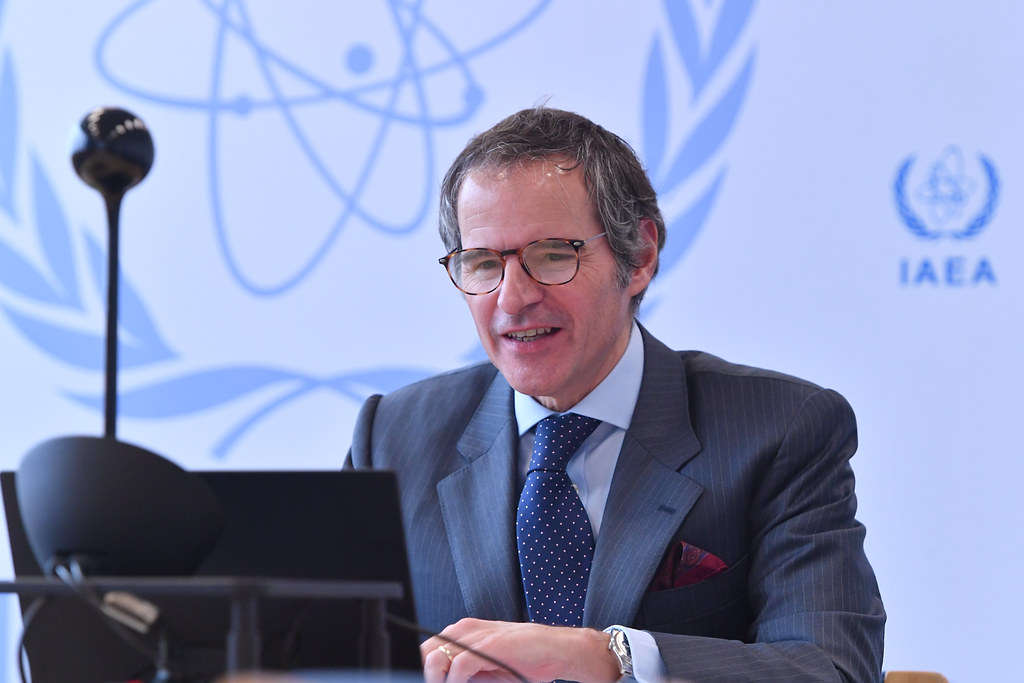FRESH AIR
UN nuclear watchdog head’s shocking statement on Iran
November 30, 2022 | Ran Porat

Rafael Grossi, the Director General of the International Atomic Energy Agency (IAEA), is known for carefully choosing his words, mindful of the prestige, standing and importance of the agency he leads. Asked several times over the last few months about Iran’s nuclear program, he has stopped short of calling it out for what it is – a front for an atomic weapons project. In August, for example, he avoided directly speaking about Iran’s weapons ambitions by (again) emphasising the need to allow the agency’s monitors to resume supervision of Teheran’s atomic activities. This supervision was discontinued by Iran many months ago.
However, Iran’s continuous advancement towards its atomic-bomb goal may have tested Grossi’s diplomatic prudence one time too many.
In an interview on Nov. 20 with CBS, Grossi opted to publicly, for the first time, directly tie Teheran’s actions to nuclear weapons. Asked by veteran journalist Lesley Stahl, ”How close is Iran to making a nuclear bomb?” Grossi responded with a shocking and surprising statement.
Instead of again talking in general terms, the head of the UN nuclear watchdog concluded that “At the current level of production of this enriched uranium, Iran has accumulated already enough material to have more than one device (nuclear warhead – RP), if they chose to do that.”
Grossi’s assessment is grounded in the information and analysis provided in the latest IAEA reports, indicating that as of late October Iran had amassed 62.3kg of uranium enriched to up to 60 percent purity. As the experts at the Institute for Science and International Security explain, Iran’s breakout time – the time needed to produce enough weapons-grade enriched uranium (WGU, >90%) for one warhead – is now zero, and it would only take a few weeks to produce enough WGU for up to five such warheads.
Fully aware of the gravity of what he just said, in the CBS interview Grossi also cautiously said, “But we don’t have any information that would indicate that Iran has a nuclear weapon program at the moment.” This is a clear understatement, a very diplomatically worded sentence. Grossi is speaking about the present time (“now”), while it is clear to everyone that such a program existed in Iran at least until 2004. Proof of that was published and also presented to the IAEA in the thousands of documents Israel successfully grabbed from Iran’s secret archive in 2018.
In fact, the IAEA has been investigating for several years Iran’s Possible Military Dimensions, based also on information found in the archive about the AMAD project to develop five nuclear warheads. Teheran’s refusal to cooperate with this investigation, while trying to feed IAEA inspectors with fabrications, is what led to the failure of the latest attempt to revive the by-now defunct 2015 nuclear deal (JCPOA). Iran does not want the IAEA to continue following the leads that would eventually expose the new format of AMAD – keeping the atomic bomb know-how, equipment and expertise laced into the existing nuclear program.
Iran is now slowly, but openly and routinely, ‘normalising’ its advancement towards reaching the status of a nuclear threshold country, that can obtain an atomic bomb quickly at will. In the most recent development, the Iranians moved more advanced centrifuges to underground facilities in Natanz and Fordow, and have started enriching more uranium to 60% purity.
Let’s put aside for a moment Teheran’s behavior as a rogue actor internationally and internally – the support of Russia with deadly drones and missiles; the funding, training and supplying of weapons to terror proxies across the Middle East; attempts to kill diplomats and dissidents around the world; harbouring terrorists; and the violent oppression of the Iranian people crying out for basic human rights.
Instead, let’s recap what Grossi is actually saying – Iran has engaged in A-bomb related activities and is in non-compliance with regards to its Treaty on the Non-Proliferation of Nuclear Weapons (NPT) commitments. Such a conclusion from the head of the IAEA is immensely important, almost unprecedented. It should almost automatically lead to severe punitive measures against the Islamic Republic, including referral (again) of the Iranian file to the UN Security Council, and the application of more harsh international sanctions.
Yet, the Australian Government seems oblivious to all this and out of step from the rest of the Western camp. Issuing diplomatic statements reprimanding Teheran is a good step but insufficient at this point. While the Europeans determine that Iran’s nuclear aggression means that Teheran “has taken further significant steps in hollowing out the JCPOA,” Australian Foreign Minister, Penny Wong, mused just a few days ago that “It is vital that a diplomatic solution is found that sees all parties return to the JCPOA.”
As AIJAC’s latest submission to the Inquiry into the Human Rights Implications of Recent Violence in Iran elaborates, it is time for action – reviewing and possibly significantly downgrading Iran’s relations with Australia, including closing down of respective embassies in both countries. Another immediate step required is the introduction of wider and tougher Australian sanctions against the regime, in line with what the US, the Europeans and even the Canadians are doing.
Australia must act now and stand up against Iran. There is no more time to waste.
Dr. Ran Porat is an AIJAC Research Associate. He is also a Research Associate at the Australian Centre for Jewish Civilisation at Monash University and a Research Fellow at the International Institute for Counter-Terrorism at the Reichman University in Herzliya.
RELATED ARTICLES

US Middle East strategy amid regional instability: Dana Stroul at the Sydney Institute

Antisemitism in Australia after the Bondi Massacre: Arsen Ostrovsky at the Sydney Institute





















